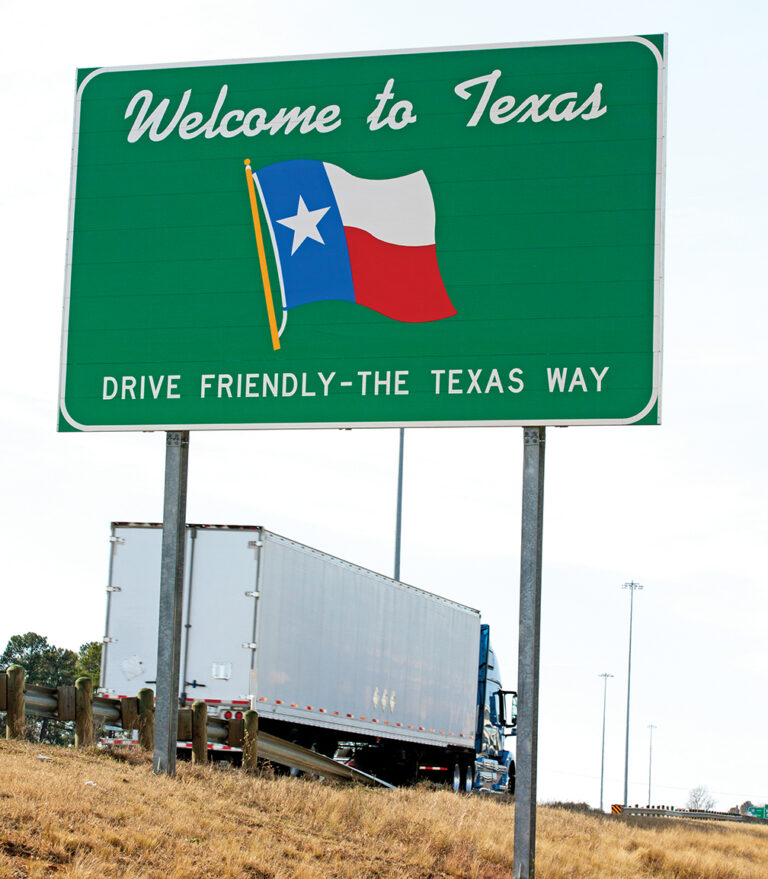Texas Gov. Greg Abbott this summer signed a new law designed to cut down on frivolous lawsuits and create a level playing field for trucking operators in the state. The bill was backed by several groups, including the American Trucking Associations (ATA), the Texas Trucking Association, the Keep Texas Trucking Coalition and the Owner-Operator Independent Drivers Association.
“For years, the plaintiffs’ bar has been perverting the civil justice system into a profit center to line their own pockets, leeching off a critical link in the supply chain and the livelihoods of honest and hardworking truckers in their pursuit of Jackpot Justice,” said ATA President and CEO Chris Spear in a release. “But those days are now coming to an end.”
Trucking is particularly big business in Texas, where the industry provides more than 735,000 jobs, accounting for 1 in 15 workers. A full 82% of Texas communities rely exclusively on trucking to move their goods. Advocates of the bill say this reliance has made the industry an easy target of “bad actors” in court, as it has across the country.
The new law is intended to screen out such claims while still allowing legitimate cases their day in court. Under the legislation, accident cases receive the same treatment as criminal trials, whereby the incident will be tried first under the negligence standard. If it is found, in a case of injury or death of another person, that the truck operator was operating “within the scope of employment,” the court is required to dismiss a lawsuit.
If negligence is found in the first phase, the matter moves to a second phase where the trucking company comes under scrutiny and where damages may be awarded. Moreover, the trucking company is only identified in cases where the matter advances to the second phase.
Travis Cox, an attorney in the Dallas office of Chamblee Ryan, focuses on motor vehicle accident claims as well as premises liability and personal injury defense. He said the bifurcated trial structure is not a new concept overall; because of this, the impact of the law may appear merely procedural. But, he said, taking the name of the carrier out of the proceedings until a case for negligence can be established is of real value to trucking companies.
“Especially under Texas law, it’s what we call the ‘direct negligence’ claim,” he said. “It’s not only (did) the company negligently train the driver, but did that failure to train lead to the accident? The most common (instance), probably, would be the company didn’t train the driver on the regulations for how many hours you’re supposed to drive in a day. The driver over-drives; he’s fatigued and hits someone. That’s an example of maybe where you can tie the failure to train to the accident.
“On the other hand, the example I use most is a company fails to train someone to fill out a company form,” he continued. “Maybe that is negligent training, but it certainly didn’t cause the driver to be negligent and cause an accident.”
While opponents of the new law worked the old saw of highway safety being affected, even personal injury attorneys specializing in big rig cases says that’s probably a stretch. However, they do call the new law a win for carriers and a complicating factor in trying legitimate cases.
“I think it’s primarily procedural,” said Greg Baumgartner, founder of the Baumgartner Law Firm in Houston. “While I don’t agree with the bill, or what it’s trying to do, I can see some of the points that were raised when it was discussed. However, the bill does make it, in my judgment anyway, harder to show carelessness on the part of the motor carrier.”
Critics of the new law also say it has the capacity to make the driver a scapegoat for incidents that should be laid at the feet of their employers. Baumgartner said a good example of this is in a case of carriers failing in their responsibility to maintain equipment.
“Maybe it wasn’t the truck driver’s fault at all,” he said. “Let’s say the truck broke down. If it wasn’t part of the pre-trip, you can’t really fault the truck driver. It was the motor carrier’s negligence that caused the breakdown and led to the accident.
“Big trucks certainly have the potential for a lot that happens,” Baumgartner continued. “The safety rules are to protect everyone — the truck driver, the other cars and pick-ups around it, everyone. If everybody knows the rules but a jury can’t necessarily hear that the rules were followed or not, I’m not sure what that accomplishes for justice.”
Cox, who wrote an article for Texas Lawyer on Law.com, said the bill isn’t perfect when it comes to eliminating frivolous claims. He said even carriers that aren’t called to a second phase of a trial will still spend considerable money preparing for a possible defense. The original bill also limited discovery which, when left unrestricted, can quickly and substantially balloon legal costs.
“Other than actually trying the case itself, having to answer voluminous discovery is very expensive for trucking companies and their insurers, especially about regulations or training,” Cox said. “The original version of the statute put a pretty hard limit where you could go back two years on company records, but you couldn’t go any further.
“It also set in place some procedural safeguards that a plaintiff doesn’t get to ask about every Federal Motor Carrier (Safety Administration) reg,” he continued. “They need to show that this reg would have caused the accident. Just because a driver has an error on their driver logs three months before the accident, that has no relation to the accident. So, in terms of cost savings, this bill could have done a lot more. I think it was originally intended to, but the legislative process is what the legislative process is.”
The Texas law, set to go into effect Sept. 1, is the latest in a string of similar reform-minded legislation nationwide. In recent months, Montana, West Virginia, Louisiana and Missouri have all passed new statutes targeting lawsuit abuse.
Dwain Hebda is a freelance journalist, author, editor and storyteller in Little Rock, Arkansas. In addition to The Trucker, his work appears in more than 35 publications across multiple states each year. Hebda’s writing has been awarded by the Society of Professional Journalists and a Finalist in Best Of Arkansas rankings by AY Magazine. He is president of Ya!Mule Wordsmiths, which provides editorial services to publications and companies.











